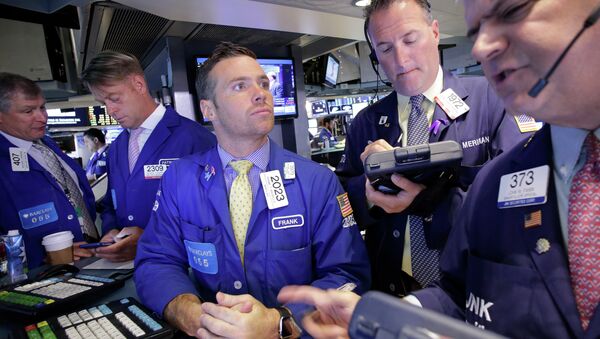Kristian Rouz – This past week saw the US stock markets advancing in a relief rally over the ultimate solution of the long-lasting Greek debt impasse, with tech shares, driven by major gains in Google's stock, propelling the Nasdaq Index to a record high. However, the downward pressure on oil, stemming from the finally concluded nuclear deal with Iran, undermined the energy sector, imparing the overall performance in S&P 500. Investors are expecting other major tech companies to follow Google's lead – which posted solid Q2 profits, having significantly surpassed all expectations – generally, the market is anticipating gains in the tech sector in the short-term.
The best week for the US tech sector propelled the Nasdaq Index to its historical peak twice – on Thursday and Friday – during this past week. However, Wall Street’s performance was mixed, as a plunge in oil prices dragged the S&P into the red, and to its lowest since January 2013. The oil producer and refiner, Chevron, dropped 1.4%. The Utilities sector also retreated, along with energy shares, sliding 1.06%.
As of Friday's close, the Nasdaq Composite Index was 0.91% up, at 5,210.14 points, while the S&P settled at 2,126.64, having rebounded slightly, up 0.11%. The Dow Jones Industrial Avg shed 0.19% to 18,086.45, adding to the market’s growing bullish sentiment.
The greatest hit to the Dow Index was a retreat in Boeing's stock, down 1.11% most recently due to the ill news regarding the aircraft-maker’s so-called 'project KC-46'. The in-air tanking aircraft, currently in the works, has reportedly weighed on Boeing's Q2 performance, rendering quarterly profits revised downward.
However, weekly gains in all three major indices were solid, with the Dow adding 1.8%, the S&P climbing by 2.4%, and the Nasdaq gaining 4.3%, suggesting investors still have a high level of confidence in US markets.
Across the pond, the Stoxx Europe 600 Index rose 4.3%, posting its best week since early this year due to the end of the Greek drama.
Now, US investors are keeping an eye on other prominent tech stocks. The likes of International Business Machines (IBM), Microsoft and Apple are reporting their Q2 profits early next week, and the overall sentiment is bullish, meaning the US tech sector is likely to extend its gains. Earnings for the S&P tech sector are projected to add some 2.7% in Q2, which is against the major trend of corporate profits being hit by a stronger US dollar.
The sentiment is that Apple’s iPhone, still boasting its over-the-top consumer-market appeal, will generate solid revenues for the company, but it is the Apple Watch sales that is attracting most attention. It is unclear whether sales of the Apple Watch will make up for the deteriorating market performance of the iPad. Moreover, as Apple is facing tougher competition from its domestic and overseas rivals, innovative products are more likely to drive gains in corporate stock than mere sales figures.
US financial institutions’ performance was uneven and mixed this outgoing week. Bank of America and Citi managed to surpass expectations, with the latter reporting best quarterly profits since 2008. Meanwhile, profits of Goldman Sachs posted their lowest profits of the last four years, were significantly lower due to court proceedings. However, the US financial sector is projected to expand by 19.1% in Q2, which is its best yearly performance among all the sectors in the US economy.




